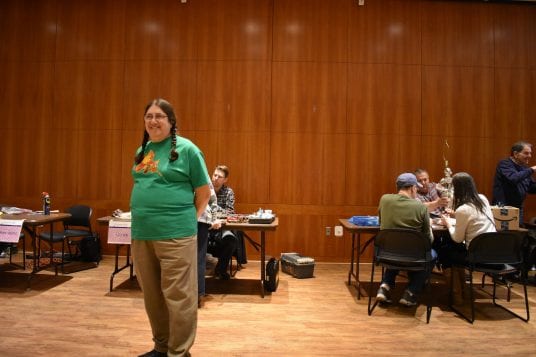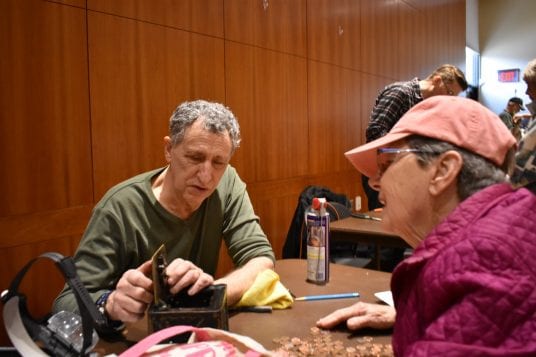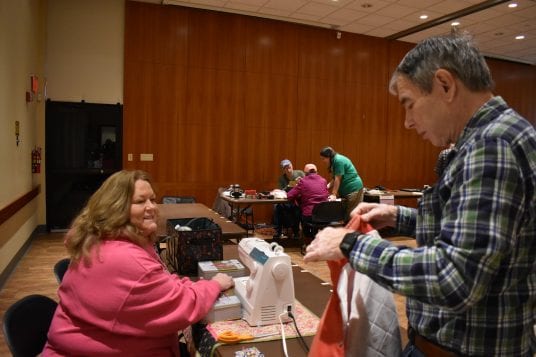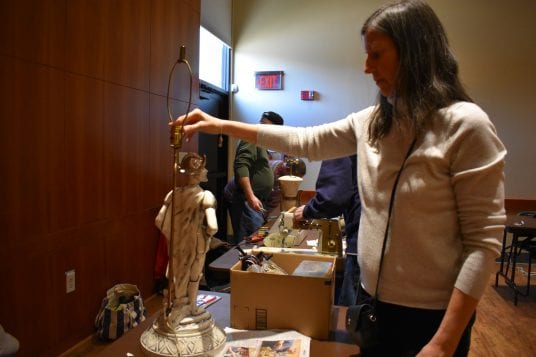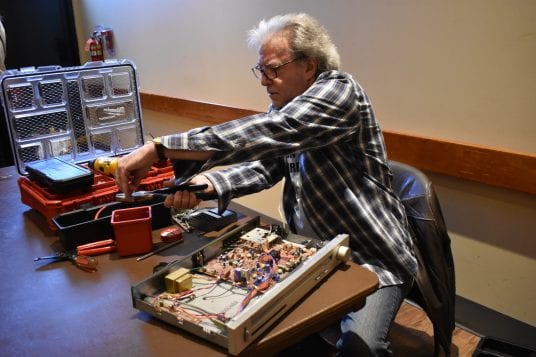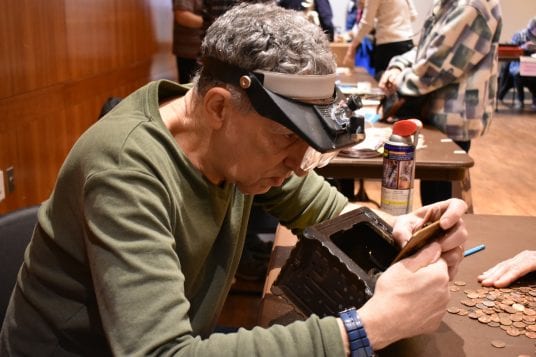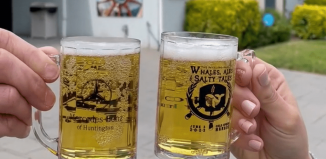Volunteers Repair Relics and Heirlooms at Comsewogue Library
Last Saturday, Feb. 29, at the Comsewogue Public Library, people from all over Long Island clutched broken antiques, busted electronics, ripped clothing and many, many battered lamps in their laps. Surrounding them were tables where fixers, experts and simple tinkerers plugging away at all things broken, trying their best to make them whole again.
Richard Feldman, a retired teacher, was one of the volunteers, called “coaches,” helping people fix their items. He’s a tinkerer, the kind of guy who could make you a homemade hammer from stained and lacquered paint stirrers and a head made from junk he found on the side of the road.
“You can fix anything, as long as you know what’s wrong.”
— Paul Orfin
Feldman was helping Centereach woman Blanche Casey open up a small antique safe. It had been closed after too many young hands of her grandchildren had fiddled with it. Casey had taken such an item to other repair shops, but none knew what to do with it. Instead at the Repair Cafe, Feldman fiddled with the safe until it finally revealed its hoard of pennies that spilled out onto the table. Casey thanked Feldman several times, but the tinkerer said sometimes such repairs require a little divine intervention.
“Sometimes, with things like this, it’s just luck,” he said. “It’s just pure fun, and I enjoy it. It’s why I’m here.”
This is not the first time Repair Cafe Long Island has come to Comsewogue. For the past several years a small group of volunteer enthusiasts have helped save broken items from dumpsters and the landfill.
Laurie Farber, of Wyandanch, has run the LI chapter of Repair Cafe since 2007, originally hosting her first at the Our Lady of Miraculous Medal Church in Wyandanch. Under Starflower Experiences Inc., a nonprofit, she has since hosted more all across Long Island, east and west, the North Shore and South Shore, and everything in between. This year she has more cafes planned than the past several years. She has events coming up in both March and April, including one at the Elwood Public Library April 20.
The first repair cafe was started by a Dutch environmentalist in the Netherlands in 2009. The nonprofit Repair Cafe International Foundation now has 16,000 chapters across 35 countries. Farber started her branch even before there was one in New York City.
“The items that come in are usually of sentimental value,” she said. “People go home with something that may have been sitting in the closet for 20 years and it may have been a simple thing to fix.”
Though many of the volunteers see such repair as a hobby, several had quite the resume. Neal Fergenson is a chief electrical engineer for a military contractor. His wife saw an ad asking for people to volunteer their time, and now he’s been at it for two years.
Just one of his projects that day was helping a woman fix her stereo system. The device had worked fine for over 30 years until this year, when the tuning knob simply stopped working. That Saturday Fergenson was busy jury-rigging a way to get the knob to connect to a post on the motherboard.
“We’re a throw-away society,” he said. “It gives people a chance to recycle things.”
Paul Orfin is an engineer at Brookhaven National Laboratory who works in the collider accelerator department, but that Saturday he was more known as the “lamp whiz.” The engineer had originally heard of the event through his local library in Patchogue.
At last year’s event, he had even put his engineering skills through their practice when he helped the library fix its 3-D printer it had on display.
“You can fix anything, as long as you know what’s wrong,” Orfin said.
Not everything can be fixed. Sometimes the items are damaged beyond repair, or, as is common these days, the necessary parts are simply unavailable.
“We already have a garbage problem, and just buying things is not always the answer.”
— Laurie Farber
A movement has been growing all across the county, called the right to repair. Car manufacturers have largely worked under a memorandum, based on a 2012 Massachusetts law providing all owners with documents and information to allow people to do their own repairs, but such ideas have not made their way into the tech sector. Under the Digital Millennium Copyright Act, passed by Congress in 1998, electronics manufacturers have largely hindered or otherwise completely forbid people from tinkering with their devices. Some states have passed right to repair laws, but the New York Legislature failed to pass one in 2015.
Such anti-consumer practices have even found their way to farm equipment, with farm utilities manufacturer John Deere using a heavy hand to stop farmers from modifying or even fixing their equipment without taking it to a dealer.
Farber said such practices are just another example why these repair cafes have blossomed all across the world. Another, and it is especially important for Long Island, is to stop much of the products from ending up in the trash.
“I think it’s a shame, we already have a garbage problem, and just buying things is not always the answer,” she said.
Gabriele Guerra, a real estate agent from Dix Hills, traveled all the way to the Comsewogue library for the chance to fix a lamp she found at the side of the road, a marble statue of a Spanish conquistador.
In 2024, the Town of Brookhaven plans to close and cap its landfill. Once that happens, nobody is sure what will happen.
Though Guerra said there is one sure thing, that people will need to think about throwing less things away.
“Everybody’s throwing things out — instead fix them, recycle, reuse, don’t dump it on the street.”

